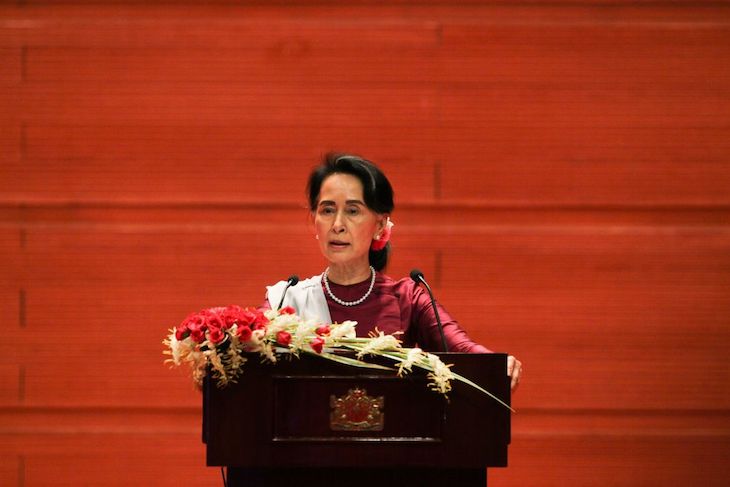Few world leaders have fallen from grace as quickly as Aung San Suu Kyi. The Nobel prize-winner, who also holds the US Congressional Gold Medal for her bravery and peaceful resistance to Burma’s military junta, now stands accused of aiding and excusing the suppression — even the genocide — of the Rohingya Muslims, more than 400,000 of whom in recent weeks have fled from Burma, which elected her leader nearly two years ago.
There have been calls from her fellow Nobel laureates for her peace prize to be annulled. The UN has described action against the Rohingya as a ‘textbook example of ethnic cleansing’ and complained that its observers have been denied access to Burma to judge the situation for themselves. Our Foreign Secretary, Boris Johnson, himself under fire, has weighed in this week, also using the term ‘ethnic cleansing’.
The plight of the Rohingya in Burma has been a cause for international concern for decades. Yet their recent treatment at the hands of Buddhist mobs and the military takes their persecution to a new level. What seems baffling to so many is the fact that this horror is happening under Suu Kyi, a human rights campaigner who was herself kept under house arrest for 15 years by the military. How, it’s asked, can she now be colluding with her former captors, looking the other way as they use the tactics — mob violence and murder — once deployed against her supporters?
The answer is that she is an extreme case of a much-repeated phenomenon — a campaigner fêted in opposition for admirable principles, but who then takes power and is found wanting.
Suu Kyi said this week that she intends to find out why half of the Rohingya population in Burma have fled. But the satellite images of about 80 burning villages are clear enough. Her spokesmen claim that the Rohingya are burning down their own villages to draw attention to themselves, even planting landmines to draw condemnation against the Burmese army. Her efforts to deny their sudden desperation to leave Burma as ‘fake news’ fools no one. About half of Burma’s Rohingyas have now fled to Bangladesh, most arriving in the past few weeks. Such an exodus does not take place without good reason.
But even if Suu Kyi did want to take on the military, she would probably fail. While she won a mandate in the 2015 election, Burma cannot be said to be democratic in a genuine sense. Her post, that of ‘state counsellor’, cannot be compared to that of a western president or prime minister. Burma has not undergone a democratic revolution but remains under the ultimate power of the military, over which she has little control or even influence. Having been placed under house arrest for much of the two decades between 1990 and 2010, Suu Kyi is now under a more metaphorical form of imprisonment.
Ought she to rediscover the bravery that led her through two decades of peaceful opposition to the military junta and make a stand against the army? That is what a true martyr would do, even if it led her to prison. Suu Kyi might, of course, have refused the position of state counsellor altogether on the grounds that it wasn’t a truly democratic position. But where would that have got her — and Burma? She would have been condemned for turning down an invitation to effect change from within.
Moreover, if she condemned — or even acknowledged — the treatment of the Rohingya then she’d be in trouble, not just with the military but the public that elected her. The Buddhist-majority Burmese population has never seen the Rohingyas as fellow citizens. The partial relaxation of the dictatorship has exposed the sectarian problems which have always bubbled beneath the surface.
All along, Suu Kyi has been a woman of the people. It is just that now the people of Burma begin to emerge in a different light — less an oppressed, homogenous group and more a mass of religious rivalries, with a Buddhist majority at odds with a Muslim minority. Add to this the incident that began the most recent spell of violence — a terror attack on an army post, committed by a group of Rohingya militants and which killed about a dozen — and the conditions for sectarian violence are ideal.
The lesson of Suu Kyi is it is far easier to be admired when you are a rebellious outsider than when you eventually win some kind of power. The reputations of Nelson Mandela, Lech Walesa, Vaclav Havel and many others also suffered from the same transition, though to a lesser extent than Suu Kyi. One day, perhaps, Burma will settle into peace and democracy. Whatever happens, Suu Kyi will not be winning any further tributes from western liberals. But we should reflect that it is not really her who has changed, so much as the circumstances in which she finds herself and our perception of her.
Got something to add? Join the discussion and comment below.
Get 10 issues for just $10
Subscribe to The Spectator Australia today for the next 10 magazine issues, plus full online access, for just $10.
You might disagree with half of it, but you’ll enjoy reading all of it. Try your first month for free, then just $2 a week for the remainder of your first year.














Comments
Don't miss out
Join the conversation with other Spectator Australia readers. Subscribe to leave a comment.
SUBSCRIBEAlready a subscriber? Log in